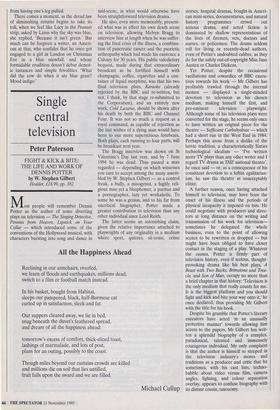Single central television
Peter Paterson
FIGHT & KICK & BITE: THE LIFE AND WORK OF DENNIS POTTER by W. Stephen Gilbert Hodder, £18.99, pp. 382 Most people will remember Dennis Potter as the author of some diverting plays on television — The Singing Detective, Pennies from Heaven, Lipstick on Your Collar — which introduced some of the conventions of the Hollywood musical, with characters bursting into song and dance in mid-scene, in what would otherwise have been straightforward television drama.
He also, even more memorably, present- ed what was in effect his own death scene on television, allowing Melvyn Bragg to interview him at length when he was suffer- ing the final crisis of the illness, a combina- tion of pancreatic cancer and the psorietic arthropathy which had made his existence a Calvary for 30 years. His public valedictory bequest, made during that extraordinary broadcast as he fortified himself with champagne, coffee, cigarettes and a con- tainer of liquid morphine, was that his two final television plays, Karaoke (already rejected by the BBC and re-written, but not, I think, by that stage re-submitted to the Corporation), and an entirely new work, Cold Lazarus, should be shown after his death by both the BBC and Channel Four. It was not so much a request as a royal command, as capable of rejection as the last wishes of a dying man would have been to our more superstitious forebears. Both plays, each running to four parts, will be broadcast next year.
The Bragg interview was shown on St Valentine's Day last year, and by 7 June 1994 he was dead. Thus passed a man regarded — depending on which witnesses you care to accept among the many assem- bled by W. Stephen Gilbert — as a control freak, a bully, a misogynist, a highly reli- gious man yet a blasphemer, a puritan and a pornographer, lazy yet workaholic. To some he was a genius, and to his far from uncritical biographer, Potter made a greater contribution to television than any other individual since Lord Reith.
The latter seems an astonishing claim, given the relative importance attached to playwrights of any originality in a medium where sport, quizzes, sit-coms, crime stories, hospital dramas, bought-in Ameri- can mini-series, documentaries, and natural history programmes crowd out serious drama, and acted fiction is dominated by shallow representations of the lives of firemen, vets, doctors and nurses, or policemen. The drums seldom roll for living or recently-dead authors, even of Potter's undoubted calibre, as they do for the safely out-of-copyright Miss Jane Austen or Charles Dickens.
Yet Potter, despite the occasional vacillations and cowardice of BBC execu- tives towards his work — Mr Gilbert has profitably trawled through the internal memos — displayed a single-minded devotion to television as his chosen medium, making himself the first, and pre-eminent television playwright. Although some of his television plays were converted for the stage, he seems only once to have written an original piece for the theatre — Sufficient Carbohydrate — which had a short run in the West End in 1984. Perhaps this arose from a dislike of the luvvie tradition, a characteristically Sixties technological idealism — 'I've written more TV plays than any other writer and I regard TV drama as THE national theatre', he once said — or, as a consequence of his consistent devotion to a leftist egalitarian- ism, he saw the theatre as unacceptably elitist.
A further reason, once having attached himself to television, may have been the onset of his illness and the periods of physical incapacity it imposed on him. He could negotiate with producers and direc- tors at long distance on the writing and transmission of his work for television— sometimes he delegated the whole business, even to the point of allowing scenes to be rewritten or dropped — but might have been obliged to have closer contact in the staging of a play. Whatever the causes, Potter is firmly part of television history, even if serious, thought- provoking drama like his best plays, A Beast with Two Backs, Brimstone and Trea- cle, and Son of Man, occupy no more than a brief chapter in that history: 'Television is the only medium that really counts for me. It is the biggest platform and you should fight and kick and bite your way onto it,' he once declared, thus providing Mr Gilbert with the title for his book.
Despite his grumble that Potter's literary executors have acted 'in an unusually protective manner' towards allowing him access to the papers, Mr Gilbert has writ- ten a splendid biography of a complex, paradoxical, talented and immensely courageous individual. My only complaint is that the author is himself so steeped in the television industry's mores and traditions as a producer and critic that he sometimes, with his cast lists, techno- babble about video versus film, camera angles, lighting, and colour separation overlay, appears to confuse biography with its distant cousin, taxonomy.


















































































 Previous page
Previous page